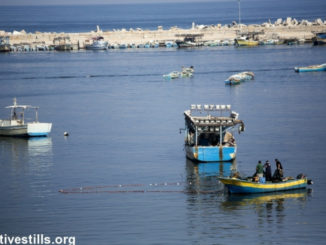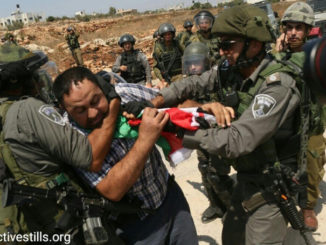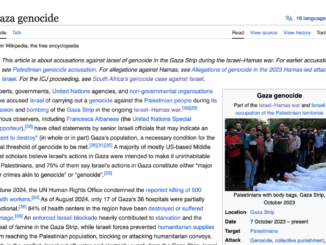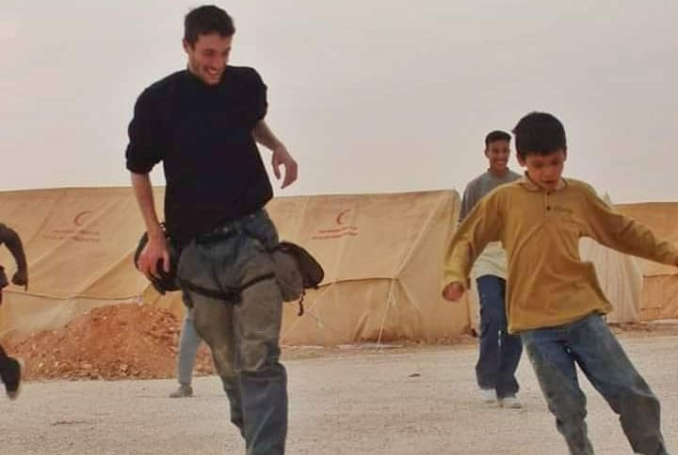
By Ilan Pappe – The Palestine Chronicle 
On January 13, we commemorated the 20th anniversary of the murder of Tom Hurndall, who was only 23 when he was killed by Israeli soldiers in the Gaza Strip.
Tom was a photography student and volunteered with the International Solidarity Movement. An Israeli sniper shot him in the head on April 11, 2003. He was left in a coma and died nine months later. The family, his mother Jocelyn, and his sister Sophie are still active in the solidarity movement as are his close friends who commemorate his work in annual conferences, a film, and a book.
Even before coming to Palestine, Tom was a committed young man and joined other brave activists from the West offering themselves as human shields against the imminent Anglo-American assault on Iraq.
Shortly after, he spent time helping Iraqi refugees, before focusing on Palestine. Tom chose to be active in the Gaza Strip, as he felt that the Western and, in particular, British press avoided honest reporting of what was going on there and he began photographing so that “no one could say, I wasn’t seeing what needs to be seen now”, he wrote back home.
On April 11, along with eight other activists, Tom was about to build a “peace tent” to protect the people, and in particular the children, from the Israeli army tank patrols.
I do not know how many of our readers have been exposed to the noise and sights of a tank rolling fast toward you on a narrow road. This is a nightmare by itself, even before one shell is shot. It was a routine action in those days in the Gaza Strip.
On that day, the Israeli soldiers at a nearby checkpoint began shooting at the activists. Tom noticed that the bullets were dangerously close to a group of children playing nearby. Some of the children began to escape, but others froze out of fear. Tom went to help them.
His father told a British inquest that Tom “went to take on a girl out of the line of fire, which he did successfully, but when he went back, as he knelt down to collect another child, he was shot”.
While running for cover, the sniper shot Tom in the head. Three hospitals tried to save his life: one in Rafah, one in Israel, and finally one in London; but to no avail.
As we know, Tom was not the only one. There is the infamous case of the murder of Rachel Corrie and less known victims of Israeli snipers: Iain Hook, a British UNRWA worker also killed by a sniper in the West Bank, in November 2022; and James Miller, a filmmaker shot in Gaza in May 2003. And in this respect, one should not forget Brian Avery, an American ISM volunteer shot and severely disfigured in Jenin in April 2003.
These killings caught the international media’s attention for only a very short while and this enabled Israel to get away with these crimes, in the same way it was absolved from the killing of one hundred Palestinians in the last one hundred days, many of them as young as Tom was, and even much younger.
It is important not to forget Tom, Rachel, Iain, James, and Brian. Amazing young activists, who fell in love with Palestine and its people – a testimony that it is the most wonderful and conscientious young people of the world who identify with Palestine and are willing to pay a high price in facing the inhuman settler colonial project on the ground.
Tom would have been in his early forties, had the Israelis not killed him, and no doubt still committed and active on behalf of Palestine. I was honored in giving the annual Tom Hurndall lecture in Manchester organized by family members and friends, who are as committed to Palestine as Tom was.
There is a new generation of activists today. Palestine has not ceased to inspire conscientious young people around the world who see the injustice there as epitomizing the injustices in many other places in the world. Their energies and commitment are like fresh water needed to quench the thirst of people under the yoke of colonization and oppression. But like any good water, it needs to be collected and channeled, so it does not get lost.
It is much more difficult today, for young Europeans and Americans who wish to show solidarity with the Palestinian struggle, to translate this impulse into voluntary work on the ground in Palestine. Many of them are blacklisted by Israel as supporters of the BDS movement and are denied entry. In any case, it seems that what the Palestinians need now, more than ever before, is for these young people to work in their own countries and pressure their governments to change their policies towards Israel.
In this respect, the BDS movement was very important in providing a home, line of activity, and strategy to the young generation of the solidarity movement with the Palestinians.
Recently, I have been involved with a new initiative, which offers additional formations for making solidarity even more effective. In January this year, the Palestine Liberation Organization (PLO), along with the civil society in the West Bank, organized the first anti-apartheid Palestinian national conference.
It is a call on governments, parliaments, and political parties in the Arab world and globally to “contribute to the dismantling of Israel’s regime of settler colonialism and apartheid”. It calls “on the people of the world and their democratic and progressive forces that uphold peace with justice to strengthen the growing global state of solidarity with the Palestinian people by enhancing the BDS movement”.
Practically, the initiative seeks to establish a global front against Israeli apartheid, by confronting legislation against BDS initiatives. It includes a particular call to progressive Jewish organizations and individuals to take part in this initiative.
Much of it would sound familiar from the past, but there is a fusion here of many existing initiatives, rejuvenated under a clear network of ‘anti-Israeli apartheid’ committees to be established locally, regionally, and globally.
This can easily be anchored in international law and United Nations resolutions, and may provide additional lines of activity for the younger generation of activists seeking to translate their solidarity into proactive advocacy.
Inside ‘48 Palestine (Israel), we responded by creating such a committee, so that beyond political dissents, or arguments about one or two states, these committees will do all they can to heed this call, to which hopefully those who are outside the PLO would respond as well.
We need to energize the solidarity movement every now and then, and the clearer the goals are, the more effective solidarity becomes.
In this journey, the sacrifices of young volunteers such as Tom and those of the Palestinians who lost their lives under the apartheid regime will be landmarks, much better understood at the end of the journey.
But on this 20th anniversary of Tom’s killing, we celebrate this young man’s life and see it as a beacon showing the way for the next generation in the international solidarity movement.
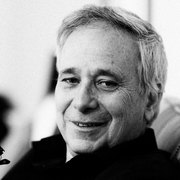
– Ilan Pappé is a professor at the University of Exeter. He was formerly a senior lecturer in political science at the University of Haifa. He is the author of The Ethnic Cleansing of Palestine, The Modern Middle East, A History of Modern Palestine: One Land, Two Peoples, and Ten Myths about Israel. He is the co-editor, with Ramzy Baroud of ‘Our Vision for Liberation.’ Pappé is described as one of Israel’s ‘New Historians’ who, since the release of pertinent British and Israeli government documents in the early 1980s, have been rewriting the history of Israel’s creation in 1948. He contributed this article to The Palestine Chronicle.

